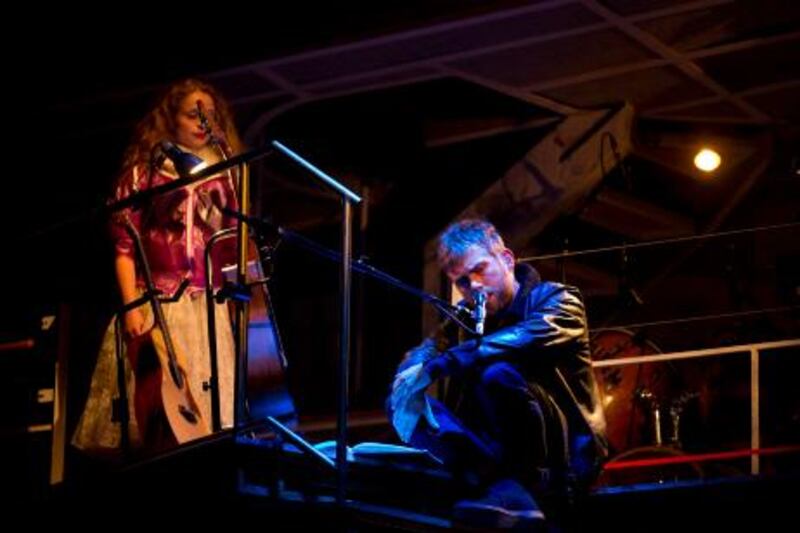Britpop royalty crowded the red carpet outside Manchester's Palace Theatre last Friday for the world premiere of Damon Albarn's new English opera, Doctor Dee. Among the celebrity-heavy audience were Alex James, Albarn's former Blur colleague, and the punk legend Paul Simonon, the former Clash bass player who recently joined the singer's cartoon hip-hop collective Gorillaz.
They joined an almost-full crowd to witness the birth of a technically impressive show that was full of spellbinding spectacle, but oddly lacking in dramatic or emotional substance. Maybe, after two decades of Albarn's scoring ever greater success with each audacious new project, Doctor Dee may prove to be the grand folly on which Britpop's golden boy finally loses his Midas touch.
Launching at the Manchester International Festival before resurfacing at the English National Opera in London next summer as part of the 2012 Cultural Olympiad, Doctor Dee is a highly ambitious collaboration between Albarn and the award-winning young opera director Rufus Norris. It is based on the colourful life of John Dee, a 16th-century mathematician and alchemist who was a contemporary of Queen Elizabeth I and Shakespeare. It is also a celebration of Englishness - pageantry, poetry, music, myth and history. "I've got a really strange emotional connection," Albarn told BBC Radio Four recently. "It really gets to me, that haunted, magical England. It's something that really stirs me in an irrational way."
The choice of Manchester for this prestige premiere is no accident. In later life, Dee lived and worked in the city. More important, Albarn has had a long and fruitful working relationship with the MIF director, Alex Poots. In 2007, he launched his highly praised Chinese opera Monkey: Journey to the West, a sister project to Gorillaz commissioned for the festival, at the same theatre as Doctor Dee.
The publicity posters outside the Palace describe Doctor Dee as "the untold story of England's greatest mystic". His greatness is hard to dispute, but his story is hardly untold. For almost four centuries, Dee has proved far too interesting a figure for biographers, novelists, dramatists and songwriters to ignore. Even in his own time, he may have inspired Prospero in Shakespeare's The Tempest and the alchemist anti-hero of Marlowe's Doctor Faustus. More recently, Dee has appeared in novels by Peter Ackroyd, John Crowley and Michael Scott, as well as Richard Byrne's stage play Burn Your Bookes and even a song - The Alchemist - by the heavy rockers Iron Maiden.
Doctor Dee was initially conceived as a further collaboration between Albarn and his Gorillaz cofounder Jamie Hewlett, plus the comic-book writer Alan Moore, the creator of Watchmen and V for Vendetta. But the singer's creative partners dropped out last year, an exasperated Moore claiming he had begun writing but "nobody had done anything else". All the same, the much-feted cult author receives a credit for "inspiration" in the official programme.
It is easy to see why writers and artists are drawn to Dee's rich, strange, colourful story. A true Renaissance man, he became a world-leading expert in mathematics, philosophy, astronomy and navigation. A scientific adviser to Elizabeth, he pushed for conquests in the Americas and was one of the first men to use the phrase "British empire". A devoutly religious man, he also dabbled in astrology, numerology and magic, pursuits that landed him in trouble more than once.
Dee's political and marital misfortunes feature onstage, but obliquely woven into a series of dreamlike tableaux which are as confusing as they are dazzling. Meanwhile, the black-clad, lightly bearded Albarn was present throughout, performing with his band high above the stage on a hydraulic platform.
Paul Atkinson's multi-level set and Katrina Lindsay's eye-popping costume designs deserve special credit here. As does Norris for some inspired theatrical touches, including the breathtaking cameo by a live crow and the superbly choreographed use of giant mobile paper walls to effect scene changes.
Albarn's musical score is a mix of downbeat chamber-pop, mostly strummed by the singer on an acoustic guitar with his six-piece band, and more strident orchestral pieces sung by the cast, some of which sound like bustling homages to Albarn's sometime collaborator Michael Nyman. On a few numbers, band and orchestra combine. The best of the songs have the same fragile folk-minstrel melancholy as Blur's more world-weary ballads. The inclusion of the veteran Nigerian Afrobeat drummer Tony Allen and the young Malian kora player Mamadou Diabate is another inspired touch, highlighting the musical common ground between west African folk music and the courtly minstrel music of Elizabethan England.
Sadly, all this technical razzle-dazzle and musical versatility never quite coalesce into a coherent story with clearly defined characters. Neither Albarn's oblique lyrics nor the pagan pageants unfolding beneath his feet convey much information about Dee's fascinating life and exotic obsessions. You could easily arrive at this production knowing nothing about its subject, and leave knowing little more. Alan Moore's storytelling prowess might well have made the difference; as it is, a few basic surtitles or voiceovers would help.
Although admirably ambitious, and unquestionably brilliant in parts, Doctor Dee ultimately feels like a missed opportunity to retell a fascinating story in a modern context. However, this is reportedly a work in progress, still evolving towards its final form. Hopefully, the version that plays in London next summer will throw a little more light on to the shadowy, magical England that haunts Damon Albarn's dreams.





